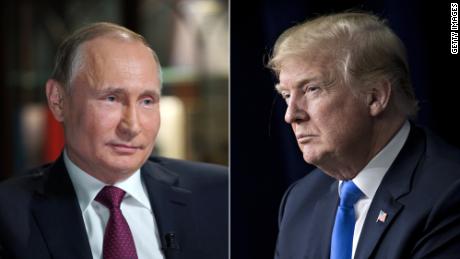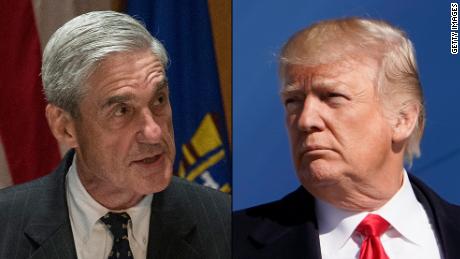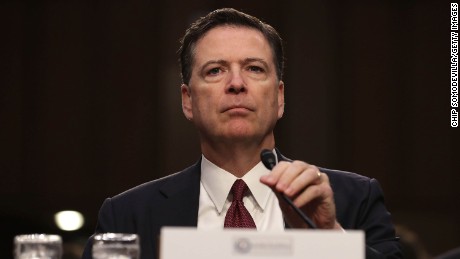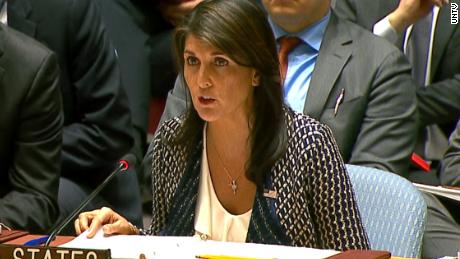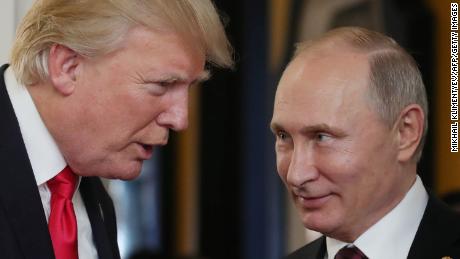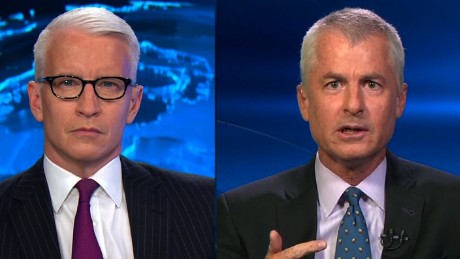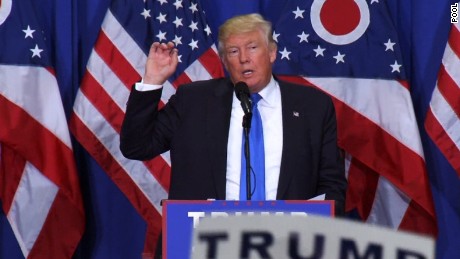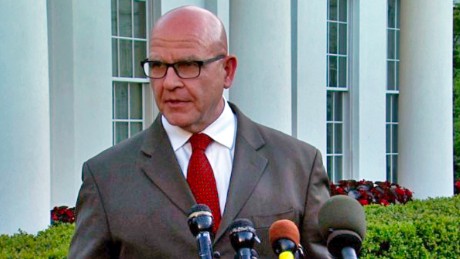Story highlights
- Trump's discussing classified information with the Russian foreign minister impacts his political standing and US national security interests
- "When he goes off script like this (it is) ultimately destructive of his own purposes."
(CNN)Donald Trump's latest crisis -- over his reported disclosure of highly classified information to Russia -- is giving voice to a question whispered privately in Washington during weeks of political turmoil: Is the President up to the job?
"This isn't really about the power of the President. He has the power to do this," former CIA Director Michael Hayden said on "CNN Tonight" Monday. "This is more about the person of the President and the performance."
The new storm engulfing an already beleaguered White House is so potentially damaging because it stretches far beyond the simple personal standing and reputation of the President.
The rumpus, first reported by The Washington Post, has national security, intelligence and international implications that White House attempts to knock down the story on Monday night conspicuously failed to address. It's even possible that lives could be at risk, considering that the information Trump reportedly shared was related to an ISIS terror plot against civil aviation -- currently the most urgent terrorist threat to the United States -- and emanated from a sensitive intelligence sharing agreement with a foreign agency.
Once again, the credibility of the White House political operation and the efforts of its communications operation to keep up with an inexperienced President's chaotic leadership style are on the line.
The many paths from Trump to Russia
"We are seeing the results of him being a bit undisciplined, impulsive, instinctive and intuitive, little patience for preparation and little patience for process," said Hayden. "When he goes off script like this (it is) ultimately destructive of his own purposes."
"We are seeing the results of him being a bit undisciplined, impulsive, instinctive and intuitive, little patience for preparation and little patience for process," said Hayden. "When he goes off script like this (it is) ultimately destructive of his own purposes."
Here's why:
1. The competence question
There are few commodities as important to presidents as a reputation for competence. Once public confidence in a commander-in-chief's capacity to do his job wanes, their political decline can be brutally swift, as President George W. Bush and Jimmy Carter could attest.
That's why this story may end up being so damaging to Trump.
Earlier uproars that buffeted the White House, over the President's inflammatory tweets and a litany of falsehoods over his inaugural crowd size, could be put down to Trump's idiosyncratic freewheeling style. Critics saw his firing of FBI Director James Comey as evidence of more worrying autocratic instincts.
But the report that Trump shared top secret information about an ISIS terror plot with Russian Foreign Minister Sergey Lavrov and Ambassador Sergey Kislyak in the Oval Office last Wednesday -- the morning after the Comey firing -- poses a more searching question about whether the President can be trusted with the gravest responsibilities that come with his office and whether he understands the implications of discussing America's most carefully guarded secrets with a US adversary.
As those questions rattled through Washington Monday night, the White House was in a bunker mentality. And even allies who have been supportive of the administration so far are now casting huge doubt on its credibility.
"They are in a downward spiral right now and have got to figure out a way to come to grips with all that's happening," said Republican Sen. Bob Corker, who is viewed as a sober and restrained influencer on Capitol Hill.
"The chaos that is being created by the lack of discipline is creating an environment that I think ŌĆö it creates a worrisome environment," Corker said.
There is not much doubt that of all the dramas that have battered this administration, the new Russia intelligence saga is the most dramatic.
Alan Dershowitz, professor emeritus at Harvard University, said Trump is safe from criminal prosecution or impeachment because a President has the power to declassify intelligence.
But he offered a stunning assessment of the gravity of the situation.
"This is the most serious charge ever made against a sitting president of the United States. Let's not underestimate it," he told CNN's Erin Burnett.
But Trump hit back early Tuesday, implicitly dismissing arguments about his competence by arguing that he had made a strategic decision to share intelligence with his Oval Office guests.
"As President I wanted to share with Russia (at an openly scheduled W.H. meeting) which I have the absolute right to do, facts pertaining to terrorism and airline flight safety. Humanitarian reasons, plus I want Russia to greatly step up their fight against ISIS & terrorism," Trump wrote on Twitter.
Former CIA Director Leon Panetta, however, told CNN's "New Day" that a lack of discipline by the President was causing him to make rash decisions.
"The President of the United States cannot just do or say or speak whatever the hell he wants. That's just irresponsible. So you need to have some people that sit down with the President before he goes into a meeting and say these are the lines you cannot cross because it relates to the security of our country," Panetta said.
2. The Intelligence angle
There have already been several reports that allied intelligence agencies, fearful of the administration's capacity to guard the most sensitive secrets, have been wary about sharing top secret information with the United States.
Those concerns are now likely to multiply.
The Washington Post said in its report, major details of which were confirmed by CNN, that Trump had told the Russians about information provided by a US partner agency in an intelligence-sharing agreement that was so sensitive details were withheld from allies and restricted even within the US government. The consequences of that could hardly be more serious, former CIA case officer Bob Baer told Burnett.
"The President, by revealing this to the Russians, has lost control of this information. It's going to go to the Syrians, It's going to go to the Iranians ŌĆö Russian allies," Baer said.
"The ability to protect that source whoever he is, wherever he is has been seriously undermined ... If a CIA officer had revealed this information to the Russians, he would be fired instantly."
The White House on Monday blasted the reports as "false." National Security Adviser H.R. McMaster said that Trump did not compromise any sources and methods.
But while the identity of the country that provided the US with the information is not publicly known, it is unlikely to be too hard for the Russians, with their highly sophisticated intelligence agencies, to work out where it came from. That leaves open the possibility that vital intelligence, key to protecting American lives, may not be available to US clandestine services in future.
Lawmakers and intelligence officials are already warning that disclosing this type of information could harm US efforts to counter an ISIS plot to place explosives in laptops and other electronic devices to evade airport security.
3. The political hit
One reason why Trump is so politically vulnerable to Monday's reports is that he anchored much of his campaign on lambasting Democratic nominee Hillary Clinton over her handling of classified information.
But now he appears to have acted in way that is just as much, if not more, injurious to American secrets as Clinton's private email scheme, exposing him to accusations of hypocrisy.
Republicans meanwhile are getting strung out by the constant chaos raging around the Trump presidency ŌĆö and that they are constantly forced to address, to the detriment of their once-in-a-generation chance to use Republican majorities on Capitol Hill to enact a conservative agenda.
Republican Sen. Susan Collins of Maine said sardonically Monday: "Can we have a crisis-free day? That's all I'm asking."
The big unknown for the White House is whether the latest Trump-triggered crisis is so significant that it wreaks political damage of greater magnitude than he has so far experienced.
It could be that the latest drama is so explosive that it opens up space between the administration and Republican leaders who have so far stood firm behind Trump. House Speaker Paul Ryan notably put out a statement seeking more information on Monday's development, but did not rush to back the President. Senate Majority Leader Mitch McConnell kept his own counsel.
It's probably still too early to assess how the constant controversies impact Republican prospects heading into the 2018 midterm elections. But as the political calendar grinds through summer, vulnerable lawmakers may begin thinking of their own skins more than the fate of the Trump administration.
That point may not be here yet, but it will not be far off if things keep going badly for the White House.
The fast moving developments of Monday night into Tuesday also again called into question the credibility of the White House -- which was already compromised by its shifting explanations for the firing of Comey. Both McMaster and his deputy, Dina Powell, used the word "false" to describe the Post's reporting. Yet Trump's tweets appeared to validate at least parts of the story.
4. The Russia question
If suspicion was rampant in Washington about the President's links to Russia before, it is going to go into overdrive now.
Already the pictures of Lavrov and Kislyak yukking it up with Trump pointed to a political gaffe by the White House. Now, Democrats are using Trump's apparent intelligence lapse to renew calls for a special prosecutor to probe allegations of Russian election-meddling and possible collusion with the Trump campaign ŌĆö and to hike pressure on Republicans on the issue.
"What we know is that it is a very, very serious threat to our national security and safety, and that's why my hope is that Republicans and Democrats will come together in favor of an independent investigation through a special prosecutor and through an independent commission," Connecticut Democratic Sen. Richard Blumenthal said Monday on CNN.
"Make no mistake: this kind of serious grave threat really requires a national response, putting country above politics."
At the very least, Monday's bombshell will renew intense curiosity about why Trump, unlike almost everyone else in Washington, does not seem to be as wary of Russia and its motives.
"It's the Russians -- we have been going through all this stuff," CNN senior political analyst David Gergen said. "Why is he giving information to the Russians of all people?"
5. The international angle
Monday's explosive disclosures erupted at a time when the President is preparing to take his first steps on the world stage. He will leave Friday for a trip to Saudi Arabia, Israel, Italy and Belgium.
That was always going to be an onerous test to such an inexperienced commander-in-chief. Now, Trump will be under even more intense pressure to counter perceptions abroad that he is out of his depth in the Oval Office and to reassure foreign leaders that America remains a force in the world under his leadership and can be relied upon to keep allies' secrets.
It is not just the reputation of the President himself that is on the line. The credibility of the United States, the most powerful nation in the world and the guarantor of Western security, is being publicly eroded.
Ultimately, it comes down to Trump himself and his attitude toward his job.
"He is very inexperienced, this is an absolutely new world to him," Hayden said. "If I fault him for anything, it's not that he's inexperienced -- he doesn't have humility in the face of his inexperience."







